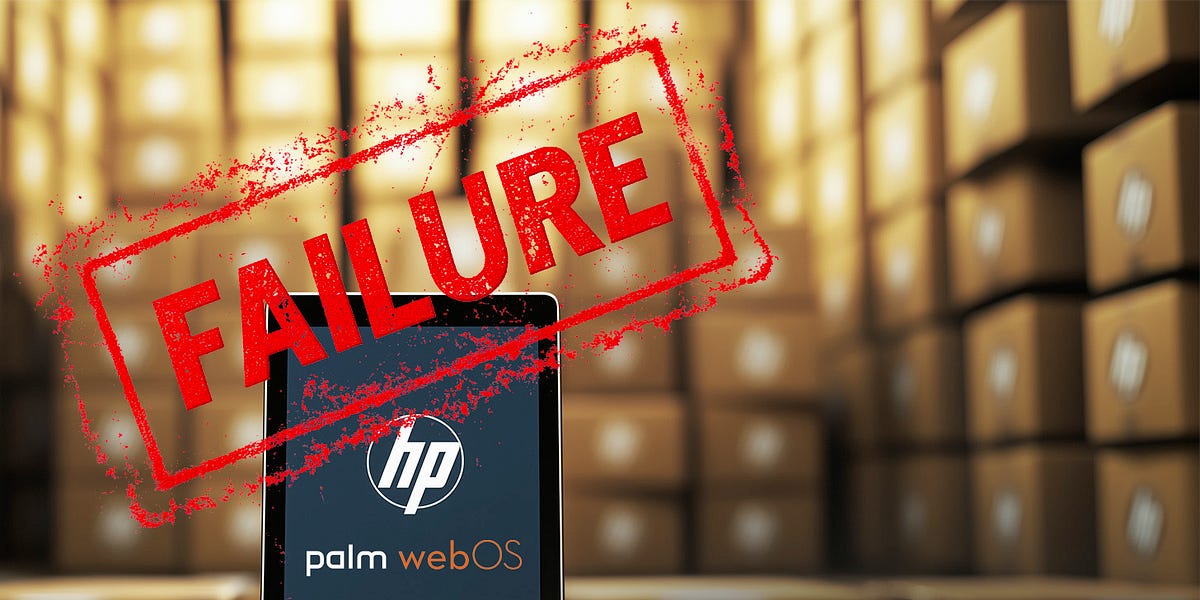I Convinced HP's Board to Buy Palm for $1.2B. Then I Watched Them Kill It in 49 Days
-
I developed one of the top ten apps in the webOS App Store. I released it about 6 months before they shuttered Palm and started the transition of webOS in to a vague "embedded and mobile things" open source OS that eventually ended up on, primarily, LG televisions.
It was my first big success as a computer science student. When I started working on my next big app idea it was about 80% complete when the new dropped that they were discontinuing all phones and tablets. Palm used to send me free phones and tablets too, and I spent a lot of time in the community forums, I had reviews on webOS Nation, and so on
I maintain to this day that enyo is one of the greatest app development frameworks ever written and I wonder what the landscape of web development would look like today if they'd moved faster to liberate it from mobile devices. The webOS team were also earlier adopters of nodeJS for their native services. It felt like living in the future using them at a time when the iPhone 4 was barely out.
If you can believe it, after that I moved over to Windows Phone, where history repeated without the afterlife. After that, I felt cursed but, honestly, I chose both platforms because the stores weren't saturated with 100 versions of every app imaginable.
They were great times. Five big mobile platforms, free devices, open APIs to work with - it really was a digital gold rush.
I now have LG TVs in every room and it's so strange to use webOS in it's final(?) form. Wonderfully, there's a homebrew community just as there was back in the day, albeit on a much smaller scale. I've even made a wrapper for some home assistant features.
webOS is dead. Long live webOS
I had a similar story with BlackBerry 10
-
I developed one of the top ten apps in the webOS App Store. I released it about 6 months before they shuttered Palm and started the transition of webOS in to a vague "embedded and mobile things" open source OS that eventually ended up on, primarily, LG televisions.
It was my first big success as a computer science student. When I started working on my next big app idea it was about 80% complete when the new dropped that they were discontinuing all phones and tablets. Palm used to send me free phones and tablets too, and I spent a lot of time in the community forums, I had reviews on webOS Nation, and so on
I maintain to this day that enyo is one of the greatest app development frameworks ever written and I wonder what the landscape of web development would look like today if they'd moved faster to liberate it from mobile devices. The webOS team were also earlier adopters of nodeJS for their native services. It felt like living in the future using them at a time when the iPhone 4 was barely out.
If you can believe it, after that I moved over to Windows Phone, where history repeated without the afterlife. After that, I felt cursed but, honestly, I chose both platforms because the stores weren't saturated with 100 versions of every app imaginable.
They were great times. Five big mobile platforms, free devices, open APIs to work with - it really was a digital gold rush.
I now have LG TVs in every room and it's so strange to use webOS in it's final(?) form. Wonderfully, there's a homebrew community just as there was back in the day, albeit on a much smaller scale. I've even made a wrapper for some home assistant features.
webOS is dead. Long live webOS
You're the goat.
-
SAP's annual revenue while Leo served as its CEO was approximately $15 billion. The HP board hired a CEO whose largest organizational experience was running a company smaller than HP's smallest division. Based purely on revenue management experience, Apotheker wouldn't have qualified to be a Executive Vice President at HP, yet the board put him in charge of a $125 billion technology company.
HP's board has done a lot of messed up stuff. I wouldn't touch HP gear with a stick.
HP and Asus taught me that specs aren't all that important sometimes.
-
“If it wasn’t for my medical leave, HP and Apple would be competing for the mobile market!”
It takes a lot of arrogance to be a senior executive; the way he tells the story justifies his position, that’s for sure.
The story doesn't add up.
June 2010 - Acquisition
Late June 2011 - medical emergency
July 1 2011 - Product launchHe's saying it's a great year of development and integration, then in the one or two weeks he's on bed rest the whole thing falls apart? Come on.
-
I was an avid Windows Phone user. What app did you develop? I might know it from the 10 that were available.
Nothing well known on WP, and I don't want to give names as it'll dox me given reviews are out there somewhere.
One was a different take on a Twitter app and another was a minimalist Instapaper app. I will say no more!
Unrelated fun story: I rewrote a plugin integration for a WP game from a fairly well known studio, 5 minutes before it was demoed live at GDC in SF, back around 2011 (+-1 year). And it went off without a hitch! Good times
-
I had a similar story with BlackBerry 10
That was one of the big 5 in my mind. I never did any BB dev, but I remember looking into it at the time. If I couldn't get a device for cheap or free it was inaccessible. Student life is what it is. By the time I made my webOS money they were already on the decline and considering a move to android so I didn't consider it thereon.
Just watched the Jay Bachurel movie recently and can recommend. It's a bit slow but the nostalgia is top grade.
-
That pissed me off so much back then. I was a big Palm/WebOS fan, having a Treo 600 and 650, then a Pre and a FrankenPre 2 (the Pre 2 didn't come out on Sprint, only Verizon, so I had to buy the Verizon version and swap out the Sprint radio from my Pre 1 and sideload custom OS modules). I also bought the TouchPad on day 1 and loved the shit out of it.
After HP killed WebOS, I sideloaded Android onto the TouchPad and kept using it for a couple more years.
I still have two of the last webos tablets. I wonder if I could load Ubuntu touch on them...
-
Nokia didn’t suddenly go all in on Windows Phone, they were bought by Microsoft.
There were only ever like 2 phones that used MeeGo. Nokia primarily used an OS called Symbian before they were bought out.
Nokia switched to Windows Phone in 2011, just before the N9 came out. They weren't bought by MS until 2014.
And yes, I know about Symbian. Meego was their intended replacement for it.
-
Up until that point hp had a stellar engineering reputation. They could have milked that for many more years, but it takes real talent to destroy that so quickly and completely
Fires the entire R&D department
Changes the company slogan to "Innovate"
-
This post did not contain any content.

I Convinced HP's Board to Buy Palm for $1.2B. Then I Watched Them Kill It in 49 Days
The systematic thinking errors that kill breakthrough technology and the decision framework that prevents these disasters

(philmckinney.substack.com)
Palm Pre is my Roman Empire.
-
That was one of the big 5 in my mind. I never did any BB dev, but I remember looking into it at the time. If I couldn't get a device for cheap or free it was inaccessible. Student life is what it is. By the time I made my webOS money they were already on the decline and considering a move to android so I didn't consider it thereon.
Just watched the Jay Bachurel movie recently and can recommend. It's a bit slow but the nostalgia is top grade.
Glen Howerton as Balsilly knocked it out of the park with that performance
-
That was one of the big 5 in my mind. I never did any BB dev, but I remember looking into it at the time. If I couldn't get a device for cheap or free it was inaccessible. Student life is what it is. By the time I made my webOS money they were already on the decline and considering a move to android so I didn't consider it thereon.
Just watched the Jay Bachurel movie recently and can recommend. It's a bit slow but the nostalgia is top grade.
I gotta say, I actually enjoyed the time programming for BlackBerry. It was the only time I actually did C++/Qt professionally. And the APIs were very inspired on the iOS/MacOS ones, so it was kinda easy for me to migrate later to iOS.
But just the same way, the guys in the university lab back then got a few BB10 devices just for sending apps to their app store.
-
SAP's annual revenue while Leo served as its CEO was approximately $15 billion. The HP board hired a CEO whose largest organizational experience was running a company smaller than HP's smallest division. Based purely on revenue management experience, Apotheker wouldn't have qualified to be a Executive Vice President at HP, yet the board put him in charge of a $125 billion technology company.
HP's board has done a lot of messed up stuff. I wouldn't touch HP gear with a stick.
He didn't even do a good job in SAP.
-
Lol, I hope they bought it back for less than they originally sold it for
I believe that's what a write down generally reflects: The asset is now worth less than its previous book value. Resale value isn't the most accurate way to look at it, but it generally works for explaining it: If I bought a tool for 100€, I'd book it as 100€ worth of tools. If I wanted to sell it again after using it for a while, I'd get less than those 100€ back for it, so I'd write down that difference as a loss.
With buying / depreciating / selling companies instead of tools, things become more complex, but the basic idea still holds: If the whole of the company's value goes down, you write down the difference too. So unless these guys bought it for five times its value, they'll have paid less for it than they originally got.






